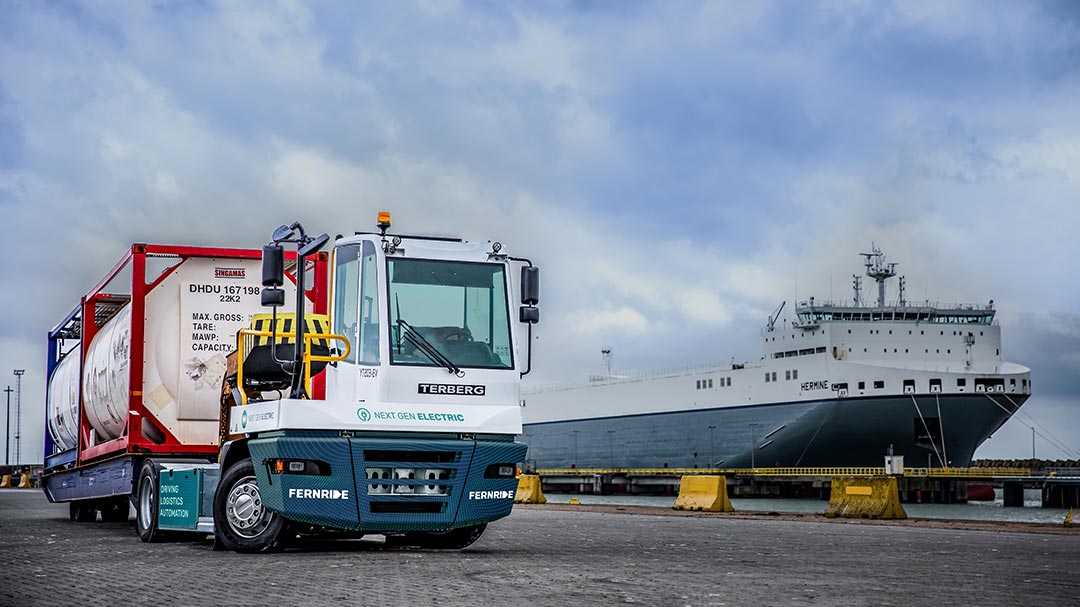Text: Juliane Gringer
Photos: Fotolia – WrightStudio, Klemens Skibicki, WU Wien, Müller – Die lila Logistik AG
Digitisation, Industry 4.0 and the Internet of Things demand a great deal from those involved in the logistics industry. These challenges are inescapable: change has become a must. How can companies tackle digital transformation and secure their futures? Find out here why you will fall behind without outside input and how decision makers can now take the wheel.
‘Only those who show courage will be rewarded in the end,’ believes Johannes Berg, managing director of Digital Hub Logistics in Hamburg. ‘Those who are content with what they have won’t produce much innovation.’ This sums up what digitisation, Industry 4.0 and the Internet of Things demand of those working in the logistics industry. They need to breathe life into the digital transformation process that is happening right now and keep adapting and repositioning themselves – change has become a must. This change is having an impact on management teams, HR departments and each individual employee alike. Staff and employers need to say goodbye to many habitual working practices and processes. How can you make a success of this shift?
‘Grumble, challenge and keep trying new things’
Networking is one thing that can help. Digital Hub Logistics in Hamburg describes itself as the ‘first port of call for digital business transformation in the logistics industry’ and offers its users a physical market place for ideas, business models, solutions and networks. ‘We enable start-ups to work directly alongside established companies in our spaces and we get the entrepreneurs together with representatives from the city of Hamburg and from the regional logistics sector. Behind this, there is a strong university network that everyone can access,’ explains Berg. He believes that clear facts and communication are the key to a successful transformation.
This is just the kind of transformation that each user at Digital Hub Logistics is undergoing: ‘Everyone who comes to us is facing a challenge and wants to change something or create something new.’ Berg gives them the same advice that he gives to anyone confronting change and hoping to shape it: ‘You should grumble, challenge and keep trying new things – after all, that’s also an incredible amount of fun.’ On the path to a perfect idea and to putting it into practice, he believes that direct communication between people is crucial: ‘Despite all the digital channels, discussing your topics with others in person is still the most important thing. In our hub, you have the opportunity to pitch an idea to the others and get direct feedback. Change is and will remain a human process.’

»Only those who show courage will be rewarded in the end. Those who are content with what they have won’t produce much innovation.«
Johannes Berg, managing director of Digital Hub Logistics Hamburg
People shape and steer the transformation
The change process needs people to shape it. It is therefore also essential to involve staff extensively in the process – and this is another important factor for a successful transformation. The greatest challenge is any change that needs to occur in the mind, believes Professor Klemens Skibicki. The keynote speaker and consultant on digital transformation explains: ‘When it comes to innovations, the new technology is generally not the problem: this follows an economic logic. But then we also have human logic: if people don’t grasp something, they reject it at first. We have to grasp the new dimensions, get to the bottom of them and then do a lot of trying out. We need the architects and helmsmen who will implement, shape and steer the change. This is challenging for anyone who hasn’t grown up with the technology.’
For his doctorate in economic history, Skibicki studied the economic logic behind a structural change: ‘It always sounds simple in retrospect: something was invented, like the steam train for example, and then this innovation became established. But in the past, people didn’t react to such a change with enthusiasm either and they tended to be hostile and scared. And of course, it’s difficult to give up acquired patterns and roles. This is because we think about the costs and risks first – and they do exist.’ But if we stand our ground and shun change, we risk much more: ‘Digital transformation is like a sledge that is racing into a valley at an ever-increasing pace – we can still decide to jump aboard and steer the course ourselves. If we leave it too late, we will simply be pulled along.’
Clever use of data and rethinking the value-added chains
Professor Skibicki sees the data that can be generated around transport as an important instrument: ‘There is a totally new opportunity to add value by gathering data and creating new links. To tap into the potential revenue, you need to think through your service in detail and convert it into value.’ The expert says that you shouldn’t have any fears about using data: ‘Data is not dangerous! It can be very useful for us. We just have to find the ways in which it can help us.’ The competition is great, after all, as those from outside the industry have also pushed their way onto the market: ‘Google has completed the most test miles for autonomous driving,’ says Professor Skibicki. ‘They are gaining an unfathomable amount of data here and more and more knowledge that can be sold in many different places.’ He himself has been working in media companies for a long time – in the very sector that was the first to be affected by digitisation. ‘I can still remember what people were saying in 2012: “We don’t need to get involved with Instagram, it’s just about pictures …” People shouldn’t make the mistake of projecting their own previous value-added chain onto new technologies.’

»Digital transformation is like a sledge that is racing into a valley at an ever-increasing pace – we can still decide to jump aboard and steer the course ourselves. If we leave it too late, we will simply be pulled along.«
Professor Klemens Skibicki, keynote speaker and consultant on digital transformation
Thinking outside the box requires a different perspective
Professor Skibicki also recommends not restricting your horizon too much – and bringing in support from outside. ‘It is important that you run through a possible change scenario thoroughly and systematically: what might it look like exactly; what does it mean for me as a business? You need a cognitive understanding but also emotional involvement. Help from outside can be very useful here.’ He says that mental barriers are totally normal: ‘Many people think they don’t understand what is going on currently because it is so different to what they have learnt. Here, you can find out that what you have learnt is not necessarily the best. It’s also exciting on the whole to know that the people around me are also full of questions and don’t know everything yet: it is a transformation process in which we are all learning.’
The business consultancy Müller – Die lila Consult GmbH offers external support. As a subsidiary of Müller – Die lila Logistik AG, its philosophy is to blend together consulting and implementation in order to offer the customer both aspects from a single source. Managing Director Dr Volker Sudbrink explains: ‘As a consultancy, we can make use of a broad wealth of experience from various industries. That’s important because I think the key step on the transformation journey is to develop the openness to question yourself too – and to learn from others. Logistics professionals need to look at the bigger picture, analyse innovative concepts from other sectors and see for themselves whether they can learn from them. Many still find this difficult.’ When it comes to using new technologies, the important thing for him is not about using as many of these new technologies as possible – it is much more about identifying the particular ones that offer an opportunity to stand out from the competition: ‘Everyone needs to find their own individual digital path.’

»Logistics professionals need to look at the bigger picture, analyse innovative concepts and see for themselves whether they can learn from them.«
Dr Volker Sudbrink, managing director of Müller – Die lila Consult GmbH
The supply chain is becoming the supply network
In their consultancy work, Sudbrink and his team think holistically: ‘We look at the entire supply chain – which no longer exists in the classic sense. Nowadays, the customer places an order and in doing so, triggers the entire process flow for goods, information and finances via various IT systems, including in an omnichannel process. That’s why we talk about supply networks. At the same time, the typical conflicts of objectives need to be resolved between production and logistics, supply chain management, sales or purchasing in an end-to-end structure,’ says Sudbrink. When he is working with a company, he starts with a comprehensive audit of the supply network: ‘We look at all of the process areas and check how a company is currently doing in digitisation or lean management – measured against the current opportunities. I’m not just talking about robot systems and automation solutions on the shop floor – I’m actually thinking much more about the networking of individual systems. In other words – networking with suppliers too.’ He then works with the customer to develop process mapping, which makes the topics transparent: ‘We take a very analytical approach, which is highly recommended. This enables us to reveal weak spots relatively quickly and use lots of benchmarks and examples of best practice to highlight where there is potential to be unlocked in the medium or short term,’ explains the managing director. ‘The openness of a company to pursue new directions is very important. They need to break away from old, rigid structures.’
Education is shaping progress
Education is also essential in forging a path through the transformation. It starts with the basics: ‘Given the numerous changes that digitisation and other factors are bringing in, the training of specialists is a very important factor in the success of transformation,’ explains Professor Sebastian Kummer, head of the Institute for Transport and Logistics Management at the Vienna University of Economics and Business. He has a very optimistic stance on the current dynamism in the industry: ‘For me as an academic, change is always viewed as positive – after all, the academic world has always consisted of progress and change. I always see the opportunities that this holds, above all else.’
Through its work in various research projects, his institute identifies which technologies have potential and how changes are affecting the market. The team is currently looking at topics including blockchain in the supply chain and the transport industry. He strongly recommends that transport and logistics companies participate in such developments because they are now generally competing on an international stage: ‘Ultimately, they don’t want to be left behind or become dependent.’ The topics of digitisation, innovation management and start-up management are naturally incorporated into his students’ education. ‘Graduates need to be ready to provide support for the changes,’ believes Kummer. He also offers advanced training for managers: ‘We want to show them what digitisation has in store for companies. We identify which new technologies can be expected and how you can develop ideas for new business models more quickly.’

»The key to success lies in blending together specialist knowledge and start-up thinking.«
Professor Sebastian Kummer, head of the Institute for Transport and Logistics Management at the Vienna University of Economics and Business
Blending together specialist knowledge and start-up thinking
Professor Kummer believes that the logistics industry has long been rather sedate and conservative: ‘The margins were small and there was therefore little willingness to invest in fresh ideas. This scepticism can still be felt; many find it hard to integrate new things.’ One route down the middle is the ‘horse’ strategy, in which traditional companies bet on a ‘second horse’ and set up an additional start-up. These start-ups have the advantage of being more agile than the original company and they can take more risks. ‘On the other hand, the new companies mostly need to play catch-up when it comes to experience and specialist knowledge. The key to success lies in blending together specialist knowledge and start-up thinking – the companies that manage this are successful.’
From gut instinct to CPI
You only know if you are successful if you actually measure success. You need effective tools to do this. Volker Sudbrink recommends defining indices for factors such as adherence to processes, customer satisfaction, quality, costs, productivity and efficiency. ‘We use them in our work to evaluate the actual state and to compare this to the optimum state. You can then see where a company stands, where there is potential for action and which progress should be recorded. This means that you develop a simple but very effective monitoring system. We then also train the staff so that our customers can continue tracking the development themselves after the concept development and implementation phases.’ There is no end point here: ‘It is an ongoing process that is intended to continue for the long term. You don’t start a thing like this and stop doing it.’
An overview of the eight success factors for digital transformation
Networking
People
Rethink
the value-added chains
Bring in support
From the supply chain
to the supply network







